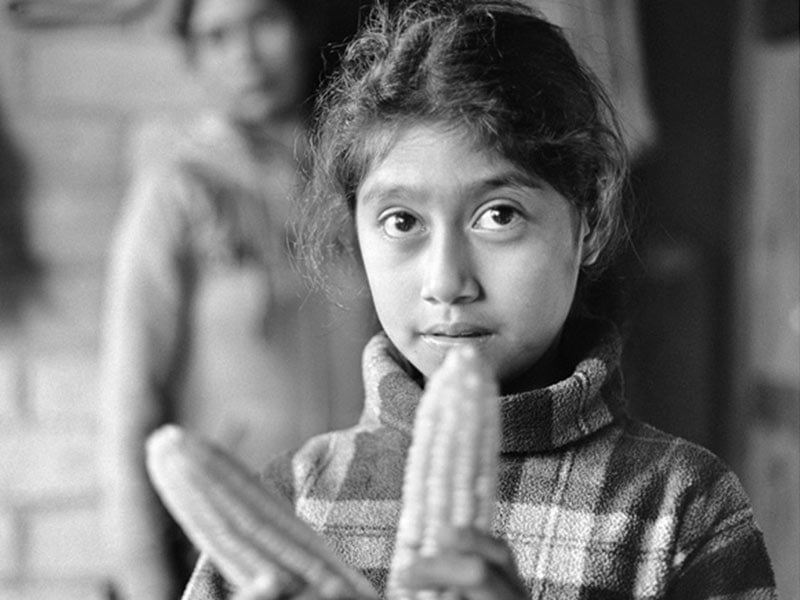In the face of societal prejudice and discrimination, members of SANGRAM, an AJWS grantee, courageously navigate the danger and stigma of sex work. Within SANGRAM, they find a safe space where they can be vulnerable, receive support and empower each other. Criminalization leaves sex workers helpless against violence and other forms of abuse, denying them the right to be safe. Visual storyteller Ranita Roy collaborated with SANGRAM to capture their shared desire for respect, understanding and acceptance that animates their pursuit of dignity and human rights. “The Other Side of Paradise” challenges perceptions of sex work and its workers, portraying their lives as complex and filled with both struggle and beauty. Photographs by Ranita Roy.
About the Project • Artist Statement • About SANGRAM • Photographer Bio
The Gallery

Sudha and Resham, both transgender sex workers, walk along a river, enjoying a peaceful setting not always typical of their lives. The friends are both activists with SANGRAM. “Everyone’s desire to live as a human being is the same,” says Sudha. “And that is what we are fighting for.”

Ranita photographed the women as they wanted to be seen — beautiful and dignified. Resham, pictured here, reflects on her struggles growing up. She recalls thinking: “My heart kept telling me that I’m a girl. But why does my mother treat me like a boy? SANGRAM gave me the courage to accept myself.”

Ranita explains why she chose the imagery in this series: “While I was listening to Resham and Sudha, they mentioned they feel completely women from the inside and they have a dream to be with a man, have a family, to be loved by a man…so I chose the jasmine flower, among other flowers, which often symbolizes love, beauty, sensuality and femininity.”

Resham adjusts the flowers in Sudha’s hair prior to the photoshoot. Sudha found solace and support at SANGRAM, where she learned about safe sex practices and began advocating for her rights.

Kasturi and Subhadra, bathed in light. Both women are activists in their community; they help with the local distribution of medicine and condoms, and travel to speaking engagements to raise awareness about harassment. Kasturi says: “We have faced numerous hardships, but our spirit remains unyielding, and we continue to advocate for our rights and well-being.”

Kiran, in a reflective moment by the river. After rebelling against an arranged marriage, Kiran ran away from home and took up sex work to support herself, experiencing abuse that was motivated by its heavy stigmatization of sex work. She eventually found her way to SANGRAM and is now an advocate for sex worker rights.

Ranita sought to transplant — if only for a moment — the women out of their daily struggle with discrimination and the deep-seated stigma associated with their work, to a serene outdoor space where they could reflect on their inner dreams. But for those who could not escape, Ranita brought the natural world inside of the studio by projecting the scenes onto the women. Kasturi (right) and Subhadra (left), close friends and members of SANGRAM, pose together.

Two friends, their silhouettes inverted and diffuse in the river’s rippling surface, stand next to each other. The water soars below. This is a mirror world — a perfect place.
About the Project
“Activism Through the Artist’s Lens” is a showcase of new photographs from three communities in the Global South depicting human rights activists in brave and illuminating ways. In Mexico, the Democratic Republic of Congo and India, AJWS and Magnum Foundation paired a talented up-and-coming local photographer with one of AJWS’s human rights grantees with the directive to upend traditional art-world power dynamics by sharing creative control equally between the artist and the subject. These collaborations yielded visually arresting images that tell powerful, evocative stories, giving us precious insight into what motivates and inspires these activists, as well as an intimate glimpse into how their traditions and identities intertwine in the course of their critical work.
The Collaborators
Sampada Grameen Mahila Sanstha (SANGRAM) is a leading feminist advocacy organization based in Sangli, Maharashtra, India, that strives for the collective empowerment of sex workers. Through community-led organizing, they work to prevent HIV and gender-based violence—and address gender inequity at the grassroots level. Collaborating with members of allied movements for health and women’s rights, they advocate to change discriminatory norms, policies and laws and fight for the right of sex workers to live with dignity as their true selves.
Ranita Roy is a National Geographic Explorer and storyteller from Andul, India. She crafts evocative narratives that blend fiction and reality. Based between Kolkata and Uttarakhand, Roy’s work delves into themes related to the environment, social justice and mental health. Her work has been published by the Reuters news agency, The Washington Post Magazine, The New York Times, CNN, The Caravan, NPR, The Guardian and Microsoft. Her short film “BAPI” has been exhibited at the Breda Photo Festival in the Netherlands and the Jakarta International Photo Festival in 2023. She now captures Uttarakhand’s cosmic serenity through alternative photography in Whispers of Cosmic Stillness.
Artist Statement
Each of the members of the SANGRAM community has a unique and beautiful story. Despite facing societal prejudices and discrimination, these sex workers bravely confront the challenges and stigmas associated with their profession. Within the comforting embrace of SANGRAM, they have discovered a safe haven where they can share their vulnerabilities without judgment. The organization is a pillar of support, fostering an environment where they can grow, empower one another and embark on a journey of personal transformation. They all yearn for respect, understanding and acceptance—longing to be seen as human beings beyond their occupation.
With this project—a collaboration between AJWS, Magnum Foundation, SANGRAM and myself—I aimed to depict the dream-like hope that emanates from their pursuit of dignity and rights. Through this lens, I believe we can shift the perception of sex work—and who sex workers are—for all who witness these photos and hear these stories.
The lives of SANGRAM community members are not simple, nor are they easy. But they are lives lived truthfully and honestly. And with my photography, I wanted to portray the many layers of struggle and hardship coexisting with beauty, love and friendship.
—Ranita Roy
About our Co-Sponsor
Magnum Foundation expands creativity and diversity in visual storytelling, activating new audiences and ideas through the innovative use of images. Through grants, mentorship and creative collaborations, we partner with socially engaged imagemakers exploring new models for storytelling. Since our founding in 2007 by members of the Magnum Photos cooperative, we have made more than 600 direct grants to visual storytellers from over 80 countries. To find out about upcoming exhibitions and events, learn about grant opportunities or join our community of support, please visit www.magnumfoundation.org.
Image at top of page: Ranita and the women experimented with light and shadow in the studio, creating here a hazy chiaroscuro that might mirror the uncertainty of the activists’ lives.



